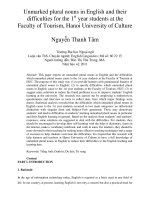UEfAP grammar exercises plural nouns
Bạn đang xem bản rút gọn của tài liệu. Xem và tải ngay bản đầy đủ của tài liệu tại đây (75.6 KB, 1 trang )
UEfAP Grammar: Exercises Plural Nouns
Grammar in EAP
Exercises
Plural Nouns
Identify the plural nouns in the following text.
The normal reason for accepting a piece of advice is that it is likely to be sound advice. The normal
reason to offer advice is the very same. It will be clear that these judgments of normality are
normative. But the very nature of advice can only be understood if we understand in what spirit it is
meant to be offered and for what reasons it is meant to be taken. The explanation must leave room for
deviant cases, for their existence is undeniable. But it must also draw the distinction between the
deviant and the normal, for otherwise the very reason why the `institution" exists and why deviant
cases take the special form they do remains inexplicable.
The example of advice is close to the case of authority. Indeed some, though not all, advice is
authoritative advice. It is, for example, sometimes justifiable to accept someone's authority in order not
to hurt his feelings. Many grownup people feel obliged by such considerations to continue to
acknowledge the authority of their parents over them. But just as in the case of advice, and for the very
same reasons, such grounds for recognizing the authority of another, even though sometimes good,
are always deviant grounds.
Slightly different considerations show that some reasons for recognizing the authority of another are
secondary. To call them secondary means that they are valid reasons only if they accompany other,
primary, reasons which also conform to the normal justification thesis (whereas deviant reasons may
validly replace the normal reasons). Accepting the authority or leadership of a person or an institution
is, for example, a way of defining one's own identity as a member of a nation or some other group,
though needless to say it is unlikely to be the only way any person will express his identification with
such a group. Such a reason can be a perfectly valid reason, but only if there are other reasons which,
in accord with the normal justification thesis, support the authority of that person. The secondary
reasons help to meet the burden of proof required to establish a complete justification, i.e. they may
suffice in conjunction with the primary reasons in circumstances in which the primary reasons alone will
not be enough to establish the legitimacy of an authority. But reasons of identification and self
definition cannot by themselves establish the legitimacy of an authority.
Press this if you want to check your answers: Answer
/>
1/1









